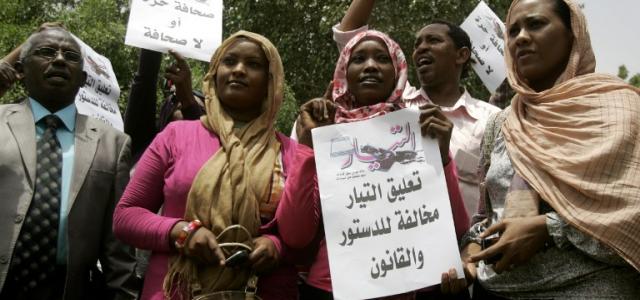
Sudanese journalists protest an earlier newspaper seizure: “press freedom or no press.”
Photo © Agence France-Presse
In the midst of a press censorship spree over the weekend, Sudanese government authorities seized the entire Sunday print run of Al-Khartoum newspaper, apparently in retaliation for an editorial cartoon that appeared on the front page. Ironically, the cartoon criticized the one-sided nature of ongoing “dialogues” which are intended in part to improve freedom of expression in the country.
The dialogues began in 2014, seeking stability and consensus between disparate political factions and rebel fighters in Sudan after the secession of South Sudan. The committee facilitating the negotiations is known as 7+7 and nominally includes representation from many parties, but in reality the process is fully controlled by President Omar al-Bashir’s ruling National Congress Party.
In the cartoon that apparently led to the seizure of Al-Khartoum yesterday, cartoonist Hashim Karouri depicted the dialogue itself as an exasperated woman standing out of reach of a lusty man representing NCP. Karouri told the Paris-based Sudan Tribune that “he meant to send a message saying that the ongoing dialogue is futile” as long as NCP is the only party speaking.
Government security forces also seized the print runs of another newspaper, Al-Sudani, on both Friday and Saturday. In that case they were attempting to suppress a report on water pollution written by journalist Hiba Abdel-Azeem, who was arrested after submitting her article but before it went to press. The two banned issues of Al-Sudani also included a series of columns by the newspaper’s editor-in-chief criticizing the arrest of Abdel-Azeem.
The government seizure of newspapers at the source has been a frequent tactic to impede the free flow of information throughout 2015, but authorities and 7+7 had supposedly reached an agreement just last week to “stop political detention, press censorship, and to ensure freedoms of political parties and individuals during the dialogue process.” The agreement evidently did not hold for very long, considering that the Al-Sudani and Al-Khartoum suppressions began the next day. We salute Karouri, Abdel-Azeem, and all the courageous Sudanese journalists who continue reporting and editorializing in the face of government intimidation!
Help support CBLDF’s important First Amendment work in 2015 by visiting the Rewards Zone, making a donation, or becoming a member of CBLDF!
Contributing Editor Maren Williams is a reference librarian who enjoys free speech and rescue dogs.